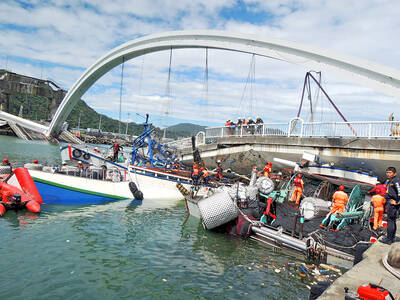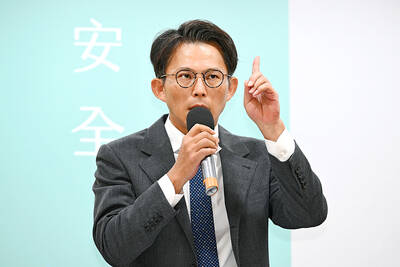With the commencement of the summer holidays, the Taipei Children’s Art Festival (台北兒童藝術節), which opened last week, is providing a remarkable range of entertainment for the young and young at heart. Celebrating its 10th anniversary, this event has proven enormously popular once again, performing to full houses throughout its first week. The official program runs until Aug. 2.
Adults can indulge their artistic proclivities with the outstanding program that makes up the Taipei Arts Festival (台北藝術節), which opens on Aug. 12 and runs through to Sept. 6. Tickets are already selling fast, and several shows are booked out. The festival prides itself on bringing cutting-edge international performances to Taipei, but if the program feels too mainstream, an alternative is the mayhem of the Taipei Fringe Festival (台北藝穗節), which opens on Aug. 29 and runs until Sept. 13. As many of the shows will be in small venues, tickets for popular acts are likely to go fast.
The second Taipei Fringe Festival was officially launched earlier this week at an event at which 60 of the 80 participating groups each presented a 30-second sketch of their shows. As the policy of the fringe festival is to admit all comers, the quality was necessarily uneven, ranging from the polished to the inept. A knife-juggling act almost led to a press photographer being impaled by an errant blade.
The styles of performance are equally varied, ranging from serious experimental theater to schoolroom sketches, from folk dance groups to break dance teams, from the stridently political to the humorous and even risque. There is belly dancing, flamenco and Punjabi dance. There is something for everyone.
The total of 246 performances will be scattered over 14 venues, and artistic director Wang Wen-yi (王文儀) of the Taipei Culture Foundation (台北市文化基金會) said that this was an opportunity not just to nurture performance groups, but also to develop alternative art spaces, so in addition to well-known locations such as Guling Street Theater (牯嶺街小劇場) and Taipei Artists Village (台北國際藝術村), venues like Paris Night Club (夜巴黎大舞廳) in Ximending, normally associated with performance of a totally different kind, have agreed to open their doors for the festival.
While there was probably more enthusiasm than talent on display at the official launch event, Taipei Fringe is an opportunity for smaller performance groups or individual artists to go before the public. Wang said that a new departure this year is the inclusion of a critic’s corner with its headquarters at the South Village (南村落) cafe off Shida Road (師大路), where reviews by professional critics and comments by audiences can be posted.
But before the free-for-all of the fringe, there will be the remainder of the Taipei Children’s Art Festival and the Taipei Arts Festival, both also organized by the Taipei Culture Foundation. The former is in its 10th year, the latter in its 11th, and both events already have an established following.
This year’s Children’s Art Festival is in particularly celebratory form, having, said Carrie Kao (高筱嘉), the marketing manager for the Taipei Culture Foundation, greatly expanded the opportunities for children to appreciate and engage in performance art.
While most of the festival’s paid performances are already sold out, this year’s festival includes an extensive program of free community performances.
“The theater performances and the community performances serve different functions and also have a different atmosphere,” said Kao. “The community performances bring theater to kids and parents who might not otherwise visit the theater. We go to them. Perhaps in the future, they might come to a performance at a theater … The community performances also allow for more interaction between the performers and the audience,” she said.
The performance lineup for the community events includes many of Taiwan’s top children’s theater groups such as Puppet Beings Theatre Company (偶偶偶劇團), Taiyuan Puppet Theatre Company (台原偶戲團), Little Giant Chinese Chamber Orchestra (小巨人絲竹樂團) and Song, Song, Song Children’s and Puppet Theatre (九歌兒童劇團).
“There is a huge variety in the community program … because it’s free and close by. It’s a chance for children to see types of performances that they might not normally encounter. It’s the first step toward a wider appreciation of art,” said Kao.
A detailed community event schedule can be found at the festival’s Web site.
Until Aug. 1, a children’s film festival has daily screenings at Taipei Puppet Museum (台北偶戲館) located at 2F, 99, Civic Boulevard Sec 5, Taipei City (台北市市民大道五段99號2樓), featuring cartoons, all dubbed into Mandarin with Chinese subtitles, from many different countries. Admission is free.
Leaving the world of childhood behind, the Taipei Arts Festival offers a showcase of the darker side of human life with a program that is partially built around contemporary reworkings of Shakespeare’s plays.
The opening event, a version of Macbeth (Aug. 12 to Aug. 15) by the Teatr Biuro Podrozy of Poland, is already sold out, and only a handful of tickets remain for director Peter Brook’s Warum, Warum (Aug. 28 to Aug. 30).
The LAFA production Ode to Joy (Sept. 4 to Sept. 6) featuring Taiwan’s own Sheu Fang-yi (許芳宜) has also sold out.
Fortunately, lesser-known groups promise some very exciting theater, particularly K. Lear (Aug. 14 to Aug. 16) by France’s International Visual Theater and Spain’s Teatre Lliure’s European House — Hamlet’s Prologue Without Words (Aug. 21 to Aug. 23). Both adaptations from Shakespeare plays, the former uses sign language and the latter body language to convey the story.
Summer Lei’s (雷光夏) concert of music inspired by Shakespeare’s sonnets, promises to reveal the acclaimed singer-songwriter in a new light, and the work of choreographer Arco Renz will feature former Taipei Dance Circle member Su Wen-chi (蘇文琪), who is now principal dancer at Renz’s Kobalt Works.
Further details of all the performances can be found on the festival’s Web site.
With activities of the Taipei Children’s Arts Festival aimed at kids aged 3 and over, the Taipei Arts Festival featuring some of the best known names in their respective artistic fields and the Fringe giving first-time artists a step-up onto the public stage, the three arts festivals cast a wide net.

Before the recall election drowned out other news, CNN last month became the latest in a long line of media organs to report on abuses of migrant workers in Taiwan’s fishing fleet. After a brief flare of interest, the news media moved on. The migrant worker issues, however, did not. CNN’s stinging title, “Taiwan is held up as a bastion of liberal values. But migrant workers report abuse, injury and death in its fishing industry,” was widely quoted, including by the Fisheries Agency in its response. It obviously hurt. The Fisheries Agency was not slow to convey a classic government

Not long into Mistress Dispeller, a quietly jaw-dropping new documentary from director Elizabeth Lo, the film’s eponymous character lays out her thesis for ridding marriages of troublesome extra lovers. “When someone becomes a mistress,” she says, “it’s because they feel they don’t deserve complete love. She’s the one who needs our help the most.” Wang Zhenxi, a mistress dispeller based in north-central China’s Henan province, is one of a growing number of self-styled professionals who earn a living by intervening in people’s marriages — to “dispel” them of intruders. “I was looking for a love story set in China,” says Lo,

It was on his honeymoon in Kuala Lumpur, looking out of his hotel window at the silvery points of the world’s tallest twin skyscrapers, that Frank decided it was time to become taller. He had recently confessed to his new wife how much his height had bothered him since he was a teenager. As a man dedicated to self-improvement, Frank wanted to take action. He picked up the phone, called a clinic in Turkey that specializes in leg lengthening surgery — and made a booking. “I had a lot of second thoughts — at the end of the day, someone’s going

The next few months will be critical in determining the future of the Taiwan People’s Party (TPP). Following party founder Ko Wen-je’s (柯文哲) arrest in September last year, Huang Kuo-chang (黃國昌) effectively became the de facto face of the party and officially became chairman in January. While Ko frequently criticized the ruling Democratic Progressive Party (DPP) and insinuated sinister intentions on the part of the DPP’s New Tide faction, his era was largely defined by the TPP slogan “rational, pragmatic, scientific,” albeit defined largely by his definition of what that meant. The tone and language used by the TPP changed dramatically